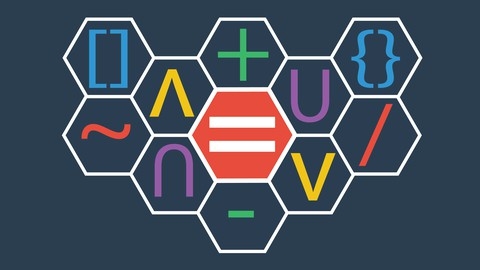Discrete mathematics is a foundational topic that lays the groundwork for many advanced computer science concepts.
From set theory and logic to graph theory and combinatorics, mastering discrete math is crucial for aspiring programmers, data scientists, and computer engineers.
If you’re looking to strengthen your understanding of these fundamental concepts, Udemy offers a wealth of comprehensive courses taught by experienced instructors.
Our curated list of the best discrete math courses on Udemy will guide you through the intricacies of set operations, logical reasoning, proof techniques, and more.
Whether you’re a beginner seeking a solid introduction or an experienced learner looking to reinforce your knowledge, these courses cater to various levels of expertise.
With hands-on exercises, quizzes, and real-world applications, you’ll not only grasp the theoretical aspects but also develop the practical skills necessary for problem-solving and algorithm design.
From mastering propositional logic and predicate calculus to exploring graph algorithms and number theory, these Udemy courses offer a comprehensive learning experience.
Discrete Mathematics
You’ll start by exploring sets, which are the building blocks of many advanced concepts.
The course covers set operations like union and intersection, as well as set properties and Venn diagrams for visualizing relationships.
Next up is logic, a crucial tool for analyzing programs and designing circuits.
You’ll learn about statements, truth tables, logical equivalences, and conditional statements.
The section on digital logic circuits introduces concepts like Boolean expressions and gate operations like NAND and NOR.
Number theory dives into the properties of integers, including divisibility, prime numbers, and methods for finding the greatest common divisor (GCD) and least common multiple (LCM).
This leads into an extensive look at proofs, covering direct proofs, proof by contrapositive, induction, and more.
Functions are explored in-depth, from evaluating and graphing to composition, inverses, and special types like injective (one-to-one) and surjective (onto) functions.
You’ll even practice long division of polynomials.
Relations are then covered, including properties like reflexivity and transitivity, as well as equivalence relations and classes.
Graph theory is a major topic, introducing graphs, subgraphs, isomorphism, and problems like finding Hamiltonian circuits or the shortest path.
Statistics fundamentals like mean, median, outliers, and standard deviation are included.
Combinatorics explores factorials, permutations, combinations, and principles like the pigeonhole principle and Pascal’s triangle.
Finally, you’ll study sequences and series, covering arithmetic and geometric progressions along with finding their partial sums.
Master Discrete Mathematics: Sets, Math Logic, and More
In this course you will learn set theory, including notation, subsets, power sets, and operations on sets.
The course dives into mathematical logic, teaching you propositional logic, truth tables, and both basic and advanced laws of logic.
Counting techniques like permutations, combinations, and the rule of product and sum are covered thoroughly.
You will also study the binomial theorem, Pascal’s triangle, and mathematical proofs like direct proofs, proof by contraposition, and proof by contradiction.
Graph theory is another key area, introducing you to graph families, degrees, paths, and circuits.
The course uses a hands-on approach with plenty of practice problems and quiz walkthroughs to reinforce your understanding.
Master Discrete Math 2020: More Than 5 Complete Courses In 1
You will start by learning the foundations of mathematical statements, set theory, and functions, which form the building blocks for more advanced concepts.
The course then dives into counting techniques, including the additive and multiplicative principles, combinations, permutations, and the principle of inclusion and exclusion.
Next, you’ll explore sequences, arithmetic and geometric progressions, and techniques for solving recurrence relations, including polynomial fitting and the characteristic root method.
The course also covers propositional logic, truth tables, and various proving techniques like direct proof, proof by contrapositive, and proof by contradiction.
Graph theory is a major focus, covering graph definitions, properties of trees, planar graphs, graph coloring, Euler paths and circuits, and matching in bipartite graphs.
Additionally, the course introduces generating functions as a powerful tool for solving recurrence relations and delves into number theory, exploring divisibility, congruences, and linear Diophantine equations.
Discrete Mathematics: Open Doors to Great Careers
The course starts with an introduction to propositional logic, covering statements, conjunctions, disjunctions, conditionals, and biconditionals.
You will learn about statement forms, logical equivalence, tautologies, and contradictions.
The course then moves on to predicate logic, teaching you how to find the truth-set of a predicate and work with quantifiers like universal and existential quantifiers.
You will also learn about negations, multiple quantifiers, and rules of inference involving quantifiers.
The course covers various methods of proof, including proving universal statements, proof by contradiction, and proof by contraposition.
A significant portion is dedicated to mathematical induction, covering both basic induction and strong induction with examples.
You will practice constructing arguments involving quantified statements and learn logical equivalences to prove other equivalences.
The course concludes with a bonus lecture, providing additional insights.
Discrete Math Series : Propositional Logic masterclass
You’ll learn about implication, double implication, and related concepts like converse, inverse, and contrapositive.
The course explains how to convert English sentences into propositional statements and represents implication in various ways.
It dives into propositional functions and quantifiers, including universal and existential quantifiers with examples.
You’ll understand how to negate propositions with quantifiers and explore the impact of domains.
The course also covers nested quantifiers, their properties, and examples.
Master Discrete Mathematics: Set Theory
The course starts with an introduction to set theory, covering the basics and providing examples to solidify your understanding.
You’ll then dive into subsets, learning how to identify and work with them through additional examples and practice questions.
The power sets section equips you with the knowledge to find all subsets of a given set.
Set operations like union, intersection, and complement are explored in-depth, complete with examples to reinforce the concepts.
The course also covers set laws, ensuring you grasp the fundamental principles governing sets.
Throughout the course, you’ll find additional questions to test your mastery of each topic.
The final exam allows you to demonstrate your comprehensive understanding of set theory.
Upon completion, you’ll receive coupons for other courses in the Master Discrete Mathematics series and the Linguistics series, expanding your learning opportunities.
Discrete Math Series : Set Theory & Algebra masterclass
You will start by learning the basics of sets, including subsets, supersets, power sets, and set operations.
The course covers various types of relations in detail, such as reflexive, irreflexive, symmetric, antisymmetric, and asymmetric relations.
You will explore the properties and cardinalities of these relations, along with their relationships and closure properties.
The course delves into transitive relations, equivalence relations, and partially ordered relations (POSET).
You will learn about totally ordered sets (TOSET) and Hasse diagrams, which are useful for visualizing ordered sets.
Throughout the course, you will solve numerous problems and examples to reinforce your understanding of the concepts.
Master Discrete Mathematics: Logic
The course starts with an introduction, covering the syllabus and logic fundamentals.
You’ll dive into propositional logic, learning how to translate statements and construct truth tables.
The course equips you with a logic laws cheat sheet, helping you understand conditionals and rules of inference.
Predicate logic and negation are explored, providing you with solutions to all exercises.
As you progress, you’ll encounter a final exam with detailed questions and solutions.
The course offers coupons for other courses in the Master Discrete Mathematics series and the Linguistics series.
Discrete Math | Learn Discrete Mathematics by easy methods
You will learn about sets, their types, operations, and Venn diagrams for visual representation.
The course delves into relations, exploring Cartesian products and different types of relations.
It covers functions, including their definitions, domains, codomains, ranges, and properties like even and odd functions.
Combinatorics is a crucial topic, covering factorial notations, the fundamental principle of counting, permutations, and combinations, with ample illustrations.
The course also introduces logic, covering basic concepts and their applications.
Mathematical induction, a powerful proof technique, is explained with examples and exercises.
Throughout the course, you will encounter numerous illustrations and quizzes to reinforce your understanding.
Discrete Math & Real-World Applications ← School Curriculum
The course starts with propositional logic, teaching you the fundamentals of logical reasoning.
From there, it dives into graphs, a crucial concept with numerous applications.
You’ll learn about sets, which form the basis for many mathematical structures.
The course also explores state machines, a powerful tool for modeling systems.
Number theory is covered in-depth, giving you insights into the properties of numbers.
Counting techniques are taught, equipping you with methods to solve combinatorial problems.
Finally, the course delves into proofs, the backbone of mathematical reasoning, teaching you various proof techniques.
Throughout the course, you’ll gain a solid understanding of these key discrete math concepts through well-structured lessons.
The syllabus ensures a comprehensive learning experience, making this an excellent choice for anyone seeking a thorough discrete math education.










